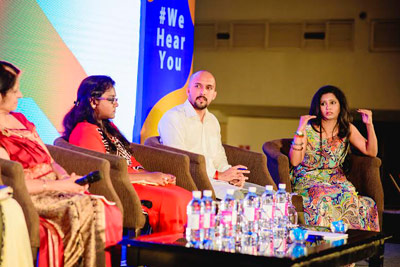Glossary of sign words for sexual and reproductive health launched
Picture this… A hearing impaired woman at a police station is reporting an incident of assault when she suddenly stops. Not because she is too traumatised to speak or because she does not know what happened to her, but because she literally does not have the words to describe her ordeal.

Panelists at the launch of the glossary
This situation is all too familiar for many Sri Lankans, especially those with hearing disabilities.
A proper glossary of sexual and reproductive health and rights terms has not been available and this has caused many issues, even the spread of misinformation in some cases.
The United Nations Population Fund (UNFPA) together with the Family Planning Association of Sri Lanka and Y PEER Sri Lanka had this in mind when they launched a national Sexual and Reproductive Health and Rights Terminology Guide at an event held at the Atrium, Cinnamon Grand recently.
The glossary contains a comprehensive list of terms in all three languages and can be used as a reference guide for health care providers and other officials.
The launch was followed by a discussion of the glossary by a panel of experts. The launch of this much awaited glossary of terms in sign language was held on December 3.
Speaking at the launch, Nishami Perera, Expert Panel Member of the Sign Language Committee appointed by the Ministry of Social Empowerment and Welfare for the Sign Language Glossary, explained the difficulties faced by people with hearing disabilities.
As a young adult who was born with hearing disabilities herself, Nishami faced issues learning about reproductive health because sex education was not taught in school then and the terminology relating to sexuality was not addressed.
She felt that if there was one action which she wanted the audience to take, it was to spread awareness and distribute the glossary freely.
Official Sign Language Interpreter and Expert Panel Member of the Sign Language Committee appointed by the Ministry of Social Empowerment for the Sign Language Glossary, Chammi Dias, felt that the signs which are in the glossary should be taught properly and without shame so that people are able to use proper terms.
Chief Guest MP Bandula Gunawardane stated that the reason the government has banned the use of mobile phones in schools and advises children not to surf the web indiscriminately is because of the lack of information and understanding among schoolchildren coupled with their curiosity could cause them harm.
Commenting on the lack of information among schoolchildren, Deputy Director General of Health Services – Ministry of Health and Indigenous Medicine, Dr. Neelamani Hewageegana, stated that sex education should be taught in an age-appropriate way beginning in preschool so that children know that they should not be abused or touched inappropriately etc.
Director (HIV and Advocacy) – Family Planning Association of Sri Lanka, Madhu Dissanayake, felt that Sri Lanka should have ‘comprehensive sexual education’ – which means that the teachers receive proper training before they teach students.


